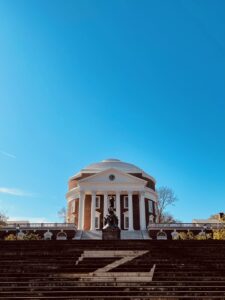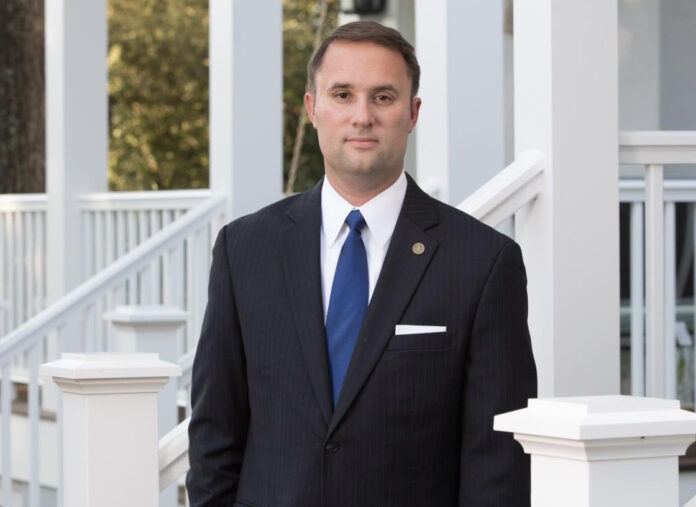In a stark contrast to the approach of his predecessor, Virginia’s newly-inaugurated Attorney General Jason Miyares (R) recently fired the university counsels for both The University of Virginia and George Mason University. Miyares, the first-ever Latino to hold that position in the Old Dominion, defeated incumbent Mark Herring (D) in his failed bid to win a third term in November 2021.
In a fact little-known outside political and higher education circles, universities have a position called counsels who provide legal and regulatory advice to a university’s board of visitors, president, and campus community. In essence, the counsel is the official lawyer for a college. For state institutions, such an individual is a public employee.
As explained in the non-partisan site baconsrebellion, such counsels serve at the pleasure of the attorney general and thus the AG has the authority to hire or fire them. This is in sharp contrast to a university’s board of visitors, where the boards consist of multiple people who serve staggered, multi-year terms. A governor can only replace such board members on June 30 in the year their term expires.
In sum, an attorney general can switch a university’s counsel in one day, but a governor can only change the board of visitors gradually, over a period of years. This little-known authority is just one more example of the power that Virginia’s executives have and living proof of the adage, “elections have consequences.”
The two individuals cashiered are Tim Heaphy at UVA and Brian Walther at GMU. A Democrat, Heaphy had earlier served as an appointee of President Obama as U.S. Attorney for the Western District of Virginia. Herring appointed him as UVA counsel in 2018.
Heaphy’s tenure at UVA has been controversial. He gained attention in 2019 when a Pakistani immigrant Hira Azher posted her now-infamous “F#&! UVA” sign by her dorm room on the UVA Lawn, a site viewed by a constant stream of students, alumni, children, visiting scholars, and tourists both foreign and domestic. The Lawn forms the core of the “academical village” Thomas Jefferson in 1819 envisioned his university would become. Due to its historic and architectural rarity, the Lawn and Grounds are linked with Monticello as a United Nations Educational, Scientific, and Cultural Organization (UNESCO) world heritage site, alongside places such as the Taj Mahal, the Pyramids of Giza, and Beijing’s Forbidden City.
Considering UVA’s undergrad enrollment of over 17,000 and Lawn rooms number only 54, residents must undergo a competitive application process to get in and living there is a rare honor reserved for only a few fourth-year students. In addition, as a revered UNESCO site, residents must agree to follow strict guidelines to live on the Lawn.

Therefore, many alumni were incensed to see a profane sign displayed so prominently in what should be an historic, dignified location. To the consternation of those offended by the public use of profanity, Heaphy defended Azher’s public vulgarity as her “free speech rights.”
In sharp contrast to the Azher case is that of Kieran Bhattacharya, a former medical student at UVA. On October 25, 2018, Bhattacharya attended a university panel discussion on the controversial and vaguely-defined topic of “microaggressions.” Dissatisfied with the definition of “microaggressions” and how they can be manifested or proven, he and the presenter engaged in some discussion and polite disagreement. Disturbed by his questioning, after the discussion a UVA faculty member filed a “professionalism concern card” identifying him as having potentially violated university policy.
In a convoluted series of events too labyrinthine to discuss here, UVA later forced Bhattacharya to get counseling him, medicated him, and branded him as a threat by having engaged in “aggressive and inappropriate interactions in multiple situations.” On December 30, UVA police ordered him to leave campus.
Through it all, Heaphy has sided with the UVA bureaucracy instead of protecting Bhattacharya’s freedom of speech at that panel discussion and in subsequent situations. Since then, Bhattacharya has filed suit that his first amendment rights were violated when he simply tried to ask questions on a university campus, a place that in theory should be open to free inquiry and discussion.
At the time of his dismissal, Heaphy had already taken a leave of absence in order to serve on the Congressional January 6 inquiry panel, so he was not working on campus anyway.
When a reporter asked AG Miyares if the ouster was in any way related to Heaphy’s work on the January 6 panel in the House, Miyares responded with a terse “zero.”
Addressing the firing, AG spokesperson Victoria LaCivita said in a statement that Heaphy had been a “controversial” hire and that Miyares’ predecessor Mark Herring had “excluded many qualified internal candidates when he brought in this particular university counsel.”

“Our decision was made after reviewing the legal decisions made over the last couple of years,” LaCivita said. “The Attorney General wants the university counsel to return to giving legal advice based on the law, and not the philosophy of a university. We plan to look internally first for the next lead counsel.”
–Scott Dreyer

